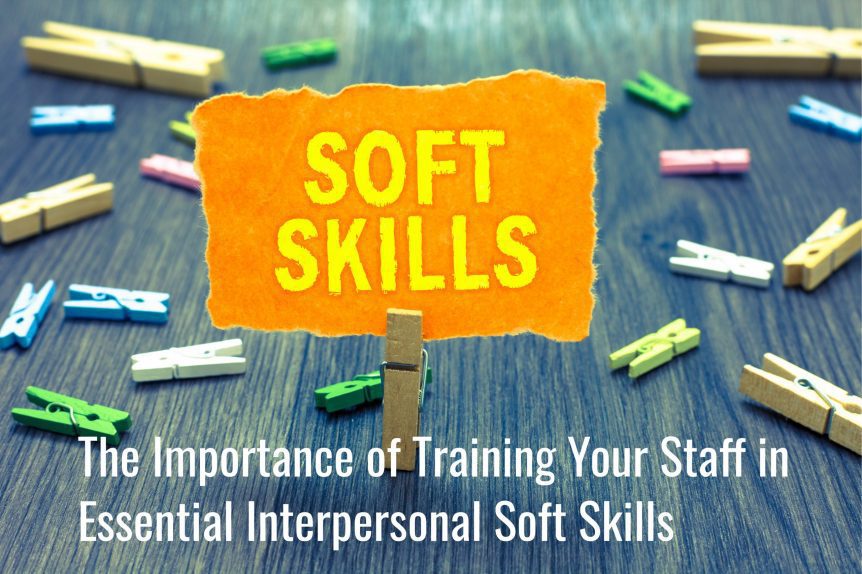The Importance of Training Your Staff in Essential Interpersonal Soft Skills
How high up on your priority list is staff training in soft skills? How high up is training in interpersonal soft skills? If training your staff in these areas is not yet on your priority list, you should consider adding them to your training strategy.
Other companies are devoting resources to developing interpersonal soft skills in their teams, so offering similar training to your staff will help you remain competitive. You will also get a jump on those companies who have not realised the benefits of interpersonal soft skills training.
In addition, training your staff in essential interpersonal soft skills is straightforward and cost-effective, particularly when you use e-learning as the delivery method. More on that in a moment, though. Let’s go back a few steps.
Soft Skills Explained
Soft skills differ from hard skills in that they are applicable to a range of roles and situations rather than being specialised or specific. They focus on personal attributes, traits, and abilities instead of knowledge, competencies, or technical abilities.
They are important because they enhance the effectiveness of your team, i.e. they enhance the effectiveness of the people who already have the hard skills your business needs. After all, your employees need more than technical abilities.
A good example is an engineer working on projects in the UAE or in Saudi Arabia. That engineer will need the correct qualifications and practical skills to complete the job, but they will also need soft skills like communication, problem-solving, and time management abilities. These soft skills will help them do the job well and deliver on the expectations of their employer and the client they are working for.
The Most In-Demand Soft Skills
There are lots of soft skills that your employees can develop. Which ones should you focus on first?
Many companies aim for task and project focused soft skills when they consider this question. Examples include the three above as well as things like the ability to delegate, build teams, and work under pressure.
According to a recent survey, however, these are not the soft skills that are most in-demand.
Instead, the soft skills that most companies are currently focusing on can all be categorised as interpersonal soft skills.
Interpersonal Soft Skills Explained
Not one of the most in-demand soft skills is a task-oriented skill. Instead, they are all interpersonal soft skills including:
- Creativity
- Collaboration
- Persuasion
- Emotional intelligence
- Adaptability
To give you an idea of what the above skills involve, they cover areas that include:
- Being understanding
- Being self-aware
- Demonstrating empathy
- Being patient
- Being aware of nonverbal communication
- Practicing active listening
- Being respectful of other people
- Communicating clearly
- Ensuring behaviour is appropriate
- Receiving feedback positively
- Etc
As you can see, these skills are people-focused, not task-focused.
The Importance of Interpersonal Soft Skills
The above list of skills and personal traits might seem strange if your focus is very much on hard skills. This is understandable, not least because hard skills are essential to have in your business too. They are also easier to quantify as individuals on your team can obtain qualifications.
That said, interpersonal soft skills should not be ignored. This is because they offer a range of benefits:
- Builds relationships with colleagues – your staff will build better relationships with each other when they develop their interpersonal soft skills, fostering and improving the team atmosphere.
- Improves relationships with clients and others – it’s not just colleagues either, as your employees will also be able to build better relationships with their clients. This translates to business benefits, including reduced client churn and increased levels of revenue per client.
- Improves communication – with better personal relationships, communication will improve. It will be less formal and defensive, becoming more positive and focused on achieving the collective goal.
- Improves team productivity – the above, including improved communication and employee relationships, will improve productivity in your business.
- Makes the work environment more positive – a more positive work environment will also develop.
- Improves employee satisfaction – following on from the above, a more positive work environment will improve satisfaction levels among your employees, helping to minimise staff turnover.
- Increases motivation levels – your employees and the teams they are part of will become more proactive with improved abilities to deal with challenges and adversity as well as an enhanced can-do attitude.
How Do You Develop Interpersonal Soft Skills in Your Team?
Interpersonal soft skills are the perfect candidate for off-the-shelf e-learning modules. After all, these skills will differ minimally, if at all, industry to industry and business to business.
Choosing an off-the-shelf option offers a range of benefits. Time to deploy is minimal, for example, as the training modules will be ready to go – just select what you need and distribute.
You will save time and money too compared to both conducting the training in person or creating a bespoke e-learning course.
Furthermore, you don’t need to compromise on quality by choosing off-the-shelf e-learning modules on interpersonal soft skills topics. At Capytech, for example, we have a partnership with Go1 to provide our clients with cost-effective off-the-shelf training modules that offer similar standards of quality as our bespoke e-learning courses.
Offering Training in Interpersonal Soft Skills to Your Employees
In summary, your competitors are likely to be upskilling their staff in interpersonal soft skills, plus the skills themselves offer benefits to your business. Combine this with the fact that deploying interpersonal soft skills training to your team is both quick and low cost; it is something you should consider investing in.
